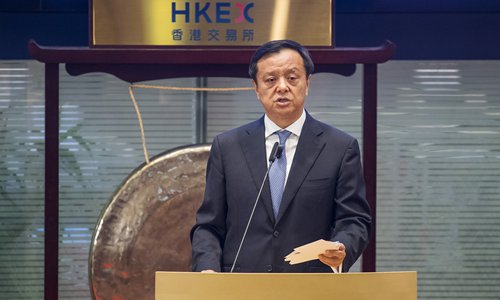
(Photo:VCG)
The head of the Hong Kong Stock Exchange on Friday denied media reports that he said the "one country, two systems" is flawed, stressing his firm belief in the principle, and that enacting the national security provision of Article 23 of the Basic Law is inseparable from universal suffrage.
Charles Li Xiaojia said at a brief press conference on Friday that "I'm a great believer of 'one country, two systems,' and I think the design of the system works perfectly," countering the Financial Times report that claimed Li said the principle had "fundamental flaws" in how it was implemented from the outset.
According to the Financial Times' report, Li said that the lack of trust is a key reason why the central government "is reluctant to give Hong Kong people…self-determination -- two systems."
There are two major problems in implementing the "one country, two systems" in Hong Kong. On one hand, there has been a lack of a legal mechanism to safeguard the "one country," and on the other hand, the arrangements for universal suffrage in the "two systems" have failed to be implemented, Li said in his clarification, according to key points from Li's remarks on Friday the bourse sent to the Global Times.
"To ensure 'two systems,' it's crucial to embrace 'one country'," he said, noting that enacting the Article 23 national security provision and carrying out universal suffrage are inseparable. Considering both sides could be a feasible plan, he added.
Beijing has reiterated that the central government won't tolerate any challenge to the "one country, two systems" principle, and will improve legislation and enforcement mechanisms for Hong Kong to safeguard national security, according to the 19th Central Committee of the Communist Party of China.
The new way of interpreting the Hong Kong matter echoed the national security risks exposed in Hong Kong during months of social unrest, analysts said.
Li's comments indicated that enacting the national security provisions while pursuing universal suffrage could be an option for the city engulfed in violence and street protests, analysts said.
The Hong Kong SAR government has yet to legislate for Article 23 of the Basic Law - a national security law to prohibit treason, secession, sedition and subversion - as mandated by the Constitutional document.
Universal suffrage of "one person, one vote" for selecting the chief executive and electing all members of the LegCo is enshrined as an ultimate aim in the Basic Law.


